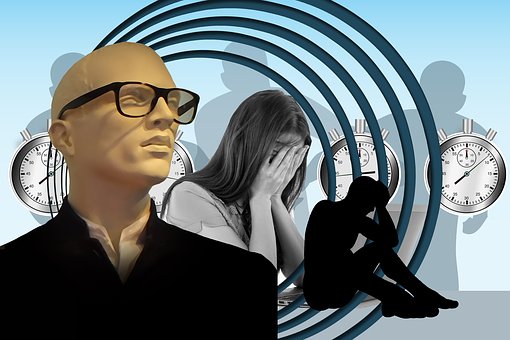The Effects of Stress on Your Health
Written by Team Biotrust
Ah… that wonderful feeling of butterflies in your stomach before leaving for an exciting trip, after getting a promotion, before meeting a new client, or finding new love.
Ack… that familiar feeling in the pit of your stomach after losing a job, getting passed up for promotion, getting stuck in gridlock, or losing that love.
It might seem crazy, but the above scenarios have a very important common thread. While they certainly feel different when you’re in the throes of them, they’re all types of stress.
Surprisingly, stress is not always bad. As Shakespeare so eloquently wrote, “For there is nothing either good or bad,but thinking makes it so.”
Stress is quite simply the body’s way of responding to change. Positive changes typically lead to positive stress. Negative changes lead to the negative stress.
Eustress vs. Distress
The “Ah” moments previouslymentioned are known as “eustress,” or positive stress. It’s pretty easy to tell the difference between this and negative stress. Eustress, which is typically short-lived and infrequent, makes you feel great. Energized. Excited. Ready to take on a new challenge. Its positive effects include:
• Increased energy and focus
• Increased coping ability
• Feelings of excitement
• Improved performance
The other type of stress is known as “distress,” which is typically long-lasting and negative. Distress saps away energy, strength, and motivation, especially if it becomes chronic. Not surprisingly, it has very different—potentially detrimental—effects on your body and health, including:
• Side effects like headache, stomachache, tight muscles, and even chest pain
• Unpleasant feelings like fatigue, irritability, anger, or anxiety
• Lack of focus and ability to learn and form memories
• Poor decision-making and impaired creativity
• Lack of motivation and decreased performance
• Impaired sleep and immunity
• Poor food choices and overeating
3 Phases of Stress
In 1950, Hans Selye proposed the General Adaptation Syndrome (GAS) theory to describe how our bodies experience and respond to stress. According to Selye, there are three stages of stress:
1. Alarm: This is the bodily excitement caused by the stress. While this phase typically lasts only a few seconds, it’s the most noticeable. Heart rate increases, blood pressure goes up, and breathing quickens. Blood is rushed to the muscles and brain, increasing focus, while blood flow to the stomach, skin, liver, and kidneys slows. Natural painkillers are released. Fats and sugars are mobilized to supply the body with the fuel it needs. You might recognize this as the “fight or flight” response. Indeed, the body is preparing to react to an immediate threat, such as running from a predator or having a car unexpectedly pull out in front of you on the highway.
While this phase is vital if you’re in a life-or-death situation, it is very costly to our bodies. It takes a lot of energy and is neither practical nor useful over longer periods of time. Instead, if the stress continues, our bodies move into the second phase.
2. Resistance: When we’re faced with a “threat” that isn’t resolved quickly, the body switches to a more moderate, less energy-intensive phase and attempts to become more balanced. It’s during this stage that the body sets in motion a cascade of reactions with a single goal in mind: Adapt. This brings up a key characteristic of eustress. Without it, we wouldn’t get better in any area of life without it (e.g., learn, grow, get stronger). Yet, if the stress isn’t removed, the body’s resources become depleted, it no longer has the energy to cope, and the body fails to adapt. Leading to the third phase…
3. Exhaustion: In this phase, the body begins to show wear and tear. If it’s prolonged or frequent, intense stress can lead to more than just a need for rest and relaxation. In fact, it can cause long-lasting or even permanent health disorders, such as lowered resistance to infection, high blood pressure, ulcers, and various other disease states.
Fortunately, you do not have to experience all phases if you are able to remove the stressor quickly. Better yet, since stress is ubiquitous, you can employ effective techniques to promote resilience, boost the body’s ability to cope, and reduce or eliminate the stress.
The Effects of Stress on the Body
While our bodies are built to handle short-term stress—both positive and negative—problems ramp up when we’re exposed to long-term stress. Even the healthiest and fittest of us aren’t built to combat stress for extended periods.
If you spend any time on social media, you’ve likely seen demonstrations of the abundance of stress most of us are constantly exposed to and how we react. In addition to causing many of us to reach for a glass or two of wine, or another cocktail, the effects of stress can also lead to over- or under-eating, anger, social withdrawal, and a desire to skip your workouts, even when you really love exercise and the benefits from it.
Stress also activates the release of hormones to produce white blood cells to fight infection and other diseases. This is a good thing when we’re looking at short-term stress. Chronic stress, however, causes suppression of the immune system, so we’re no longer able to fight the cold and flu germs that seem so prevalent on shopping cart handles.
The digestive system is also affected. Remember that the first phase of stress initiates the body’s “fight or flight” reaction, which works in direct opposition of the body’s “rest and digest” processes. Along those lines, stress can cause gas bloating, excessive blenching and farting, and inflammation of the digestive track.
Stress also affects appetite, eating behaviors, and diet quality, which can lead to weight gain or weight loss, depending on the person. People experience stress differently, with many resorting to emotional eating while others experience a loss in appetite. By raising cortisol levels, stress can also lead to storing excess belly fat, which is linked to a higher risk of diabetes, heart disease, as well as dementia later in life.
Because stress causes a chemical cascade that increases heart rate, blood pressure, and blood fat levels, it can also have a negative effect on the cardiovascular system.
And if your shoulders and neck are feeling a bit tight, or your lower back muscles spasm, you may also say thanks to the effects of stress.
If reading about stress is causing you to feel stressed, or just helping you notice the tension already in your body, there are some simple things you can do right now to help relieve stress, other than reaching for that glass of wine or a cupcake.
• Practice mindfulness: focus on the present moment, meditate, or even enjoy some rejuvenating yoga poses.
• Practice mindfulness: focus on the present moment, meditate, or even enjoy some rejuvenating yoga poses.
• Do something you enjoy: take a nature walk, spend some time in your garden, play with your pets, or visit with friends.
• Let go of your feelings: try talking with a friend, writing about the stressful event, or even crying. Practicing letting go of the stressful events and thoughts helps you overcome them rather than suppress them.
• Exercise: exercising regularly and becoming more active has multiple benefits and is one of the best ways to deal with stress. Choose what you enjoy—from running to yoga to weight training to dancing, etc.
• Breathe: whether you practice specific breathing techniques or just take a long, deep breath as you wait for the light to turn green, the computer to update, or the line to move forward, you’ll benefit.
Remember, not all stress is bad. But it’s important to deal with the effects of stress has on your health before it begins to negatively affect your health, weight, blood pressure, digestion, mood, brain power, relationships, or worse.
Get Health News you can use!
Sign up for our Newsletter NOW!


